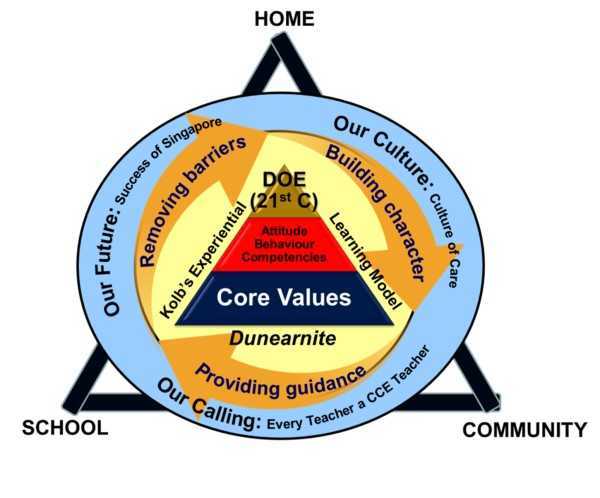Character and Citizenship Education
OBJECTIVES
CCE Vision: People of Good Character and Responsible Citizens
Every Dunearnite to be grounded in core values, as demonstrated through their attitude, behaviour and competencies, thus achieving the Desired Outcomes of Education in the 21st Century.
-
Removing all barriers to learning,
-
Building strong character and citizenship, and
-
Providing clear education and career guidance.
CCE Student Level Outcomes
Every Dunearnite a Community Youth Leader who is Confident, Concerned,
Contributing Actively and Self-Directed.
|
Sec 1 |
Sec 2 |
Sec 3 |
Sec 4 & 5 |
|
Confident people who show awareness of self, family and environment through personal leadership |
Concerned citizens who show appreciation of family, school and community through team leadership |
Active contributors who demonstrate action in the community and nation through community leadership |
Self-directed learners who demonstrate actualization in the nation and the world through global leadership |
CCE Framework

The Dunearn CCE Framework is a structure providing us clear directions and alignment on why we do what we do and how we do it. In Dunearn, students are the heart of what we do. We want to help every Dunearnite to be anchored in core values (Respect, Responsibility, Resilience, Integrity, Care and Harmony), demonstrated through their Attitude, Behaviour and Competencies, so as to achieve the desired outcomes of education in the 21st Century i.e., A Self-directed Learner, Confident Person, Concerned Citizen and Active Contributor.
The 3 colours in the middle triangle – Blue, Red and Gold – are linked
to the Dunearn school crest.
1) Blue represents discipline and steadfastness in character, so we want
every Dunearnite to be grounded in core values
2) Red represents pupils’ passion and enthusiasm for learning, so this
would be demonstrated in their attitude and behaviour
3) Gold represents the ultimate target of our endeavours, which is the
DOE in the 21st C.
Hence, while we look forward, we are also grounded in core values and not forgetting our roots and tradition.
One key CCE Pedogogical approach that we use to facilitate students’ character and citizenship development and reflection is the Experiential Learning Approach, based on Kolb’s Experiential Learning Model. Students will reflect on their experience, learn from it, and apply the lessons in everyday life.
Staffing
CCE Committee
|
Name |
Designation |
|
|
Mr Nazrul Hadi Bin Jamali |
HOD CCE (Internal) |
|
|
Mrs Hazel Lee |
HOD Educational Support |
|
|
Mr Tang Chee Kuan |
Year Head (Lower Sec) |
|
|
Mr Png Keat Siong |
School Counsellor |
|
|
Mdm Lim Sai Joo |
SEN Officer |
|
|
Ms Rashedah Khan |
Student Welfare Officer |
|
|
Mdm Norlizah |
Administration Manager |
|
|
Mdm Lailtha |
Senior Teacher |
|
|
Mr Siraj |
Teacher |
|
|
Ms Hanani |
Teacher |
|
|
Ms Siti Arnie |
Teacher |
|
|
Ms Li Yanmei |
Teacher |
|
|
Ms Anna Tay An Na |
Teacher |
|
|
Mr Wayne Tan |
SH English |
|
|
Mr Ow Gan Pin |
Teacher |
|
|
Mrs Hee Lim Gee Kheng |
Teacher |
|
|
Ms Esther Zheng Jiahui |
Teacher |
ECG Committee
|
Name |
Designation |
|
|
Mrs Hazel Lee |
HOD Educational Support |
|
|
Ms Ng Mei Ferng |
Teacher |
|
|
Ms Nur Diana Jailani |
Teacher |
|
|
Ms Pang Jia Shin |
Teacher |
|
|
Mr Muhammad Amin Morni |
ECG Counsellor |
Key Programmes and Processes
Character Education
All students participate in core CCE lessons which cover a range of content areas such as Sexuality Education, Mental Health, Education & Career Guidance (ECG), Cyber Wellness, Family Education, Peer Support and Relationship and National Education. Our teachers use a variety of facilitation strategies and educational technology to engage our students in discussions and sense-making.
Besides the core CCE lessons, CCE has also been infused into classroom lessons across a variety of subjects and school-wide programmes such as Values in Action (VIA). Our VIA programme is designed to be differentiated with the Sec 1 students doing activities related to the school or environment; Sec 2, appreciating the elderly; Sec 3, serving needy families and Sec 4/5, role-modeling service in the community (student-initiated). Some of the partners the school has worked with include SWCDC, Bukit Batok Home for the Aged, REACH Youth Powerhouse etc.
Citizenship Education
Developing a strong national identity among students has always been the focus of our National Education (NE) Programmes. The school’s NE framework is implemented through the infusion of NE into the curriculum and the commemoration of major events like Total Defence Day, Racial Harmony Day, International Friendship Day and National Day. Students are also given opportunities to attend enriching learning journeys to historical and heritage sites such as the National Museum of Singapore.






